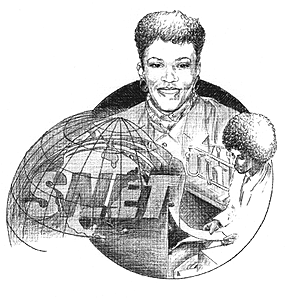



By Ray Bert '93
Barbara Gatison tackles questions in much the same way she tackles problems -- directly, intelligently and with enough energy to knock you backwards if you happen to be standing too close, or worse, getting in the way. "You can't ever get a simple answer to a question from me," she's the first to admit. In fact, she makes mincemeat of them, as she has been doing to all manner of problems and obstacles throughout her career.

Gatison is currently president of SNET America in North Haven, Conn., the interstate long-distance subsidiary of Southern New England Telecommunications. She's also president of SNET Wireline Communications, a product development house. She's reached this lofty perch after 22 promotion- studded years with the company, where she began as a systems analyst in 1974 after receiving her bachelor of science degree in biology.
"After graduation, I had an offer to do research, but the money wasn't much and I had a lot of debts," she recalls. "So I took the job with SNET, telling myself that I'd give it two years and then get back to biological research. Well, after two years I was promoted, so I gave it another two years, and then I was promoted again...."
What she discovered was that, as much as biology fascinated her, her main passion was not specific to a field but to the pursuit of solutions -- to taking on challenges and succeeding. She established herself as a master problem solver on her first day with SNET. Her supervisor assigned her the task of developing a new badge security system, a project he said was expected to take six months.
"I had no notion of how things were supposed to be done in business," she laughs, "so I just started calling people, introducing myself, setting up meetings that same day. I wasn't going to wait around for more direction." Dragging her notes home that evening, she typed up a report and created the badge background by photographing a colorful handmade blanket (so it couldn't be duplicated). Gatison completed the six-month project in one day and immediately went back for more. "From that point on I proceeded to drive them crazy," she notes.
This "get at it" style, which she attributes in large measure to her education at WPI, combined with a preternatural energy level, pushed Gatison relentlessly up the corporate ladder at SNET. "I have a very high need for learning," she says, and then adds with a laugh, "If I can't constantly be on the growth side of the learning curve, I am one evil pain in the ass."
To a large degree, Gatison's career has reflected the Plan philosophies of independence and the ability to think and solve problems in original ways. She nurtures those qualities in her subordinates, insisting that they not become pigeonholed, rewarding their willingness to learn, and giving them the power and encouragement to find solutions in their own ways. She also preaches to her staff about the need for a healthy balance between work and home life, and strives for that balance in her own life. Her "downtime" is split between her husband, Lenward, and eight-year-old son, Lenward II, and her many volunteer efforts.
Over the years, the latter have included serving on the boards of the New Haven (Conn.) YWCA and Saint Raphael's HealthCare System. She was co-chair of the Citizen's Task Force Fighting Drug Abuse in New Haven and is a member of WPI's board of trustees, an honor that, she says, both surprised and delighted her.
She has been honored by the National Association of Negro Business and Professional Women's Clubs, and earlier this year was named Minority Businessperson of the Year by Business New Haven. In 1992 she received the Milestone Award for Business from the South Central Connecticut Chapter of the National Coalition of 100 Black Women Inc., and the following year received the Business Leadership Award from the Chi Omicron Chapter of Omega Psi Phi Fraternity Inc. In 1984 she became the initial recipient of WPI's Ichabod Washburn Young Alumni Award for Professional Achievement.
In the early 1970s, she was a member of only the third class of WPI students to include women. "At the time, there was both a gender and a race dynamic for me," she recalls. "It was the time of the Black Panthers and such, and I had my fun being a radical, but I always remembered that my main focus was getting an education."
Her rebellious nature almost kept her from choosing the Plan over the traditional WPI curriculum, but she says she has never regretted the decision. Certain parts of her Plan experience stand out in her memory. "My MQP required a fair amount of electron microscopy, and my project team had to learn on the fly," she says. "We got a lot of positive reinforcement as we learned these new skills, mostly due to the one-on-one interaction with the faculty that WPI provides. The MQP research work sets up a structure that is nonstructured. It teaches you that the boundaries of what's required to do a task are not predetermined. That's an important lesson."